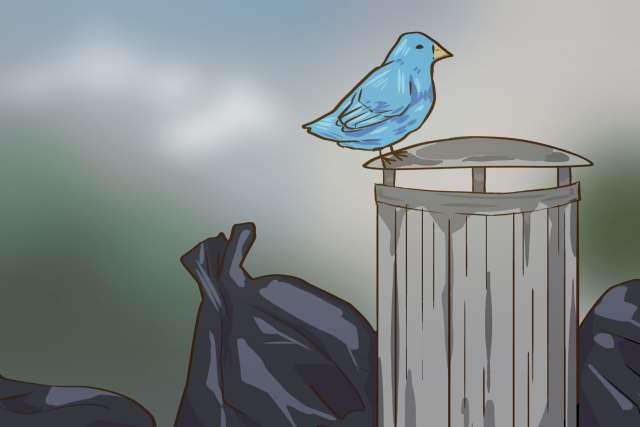[ad_1]
Of the many websites and apps that dot the digital landscape, few are as notorious as X, formerly known as Twitter. The app — which has only grown in infamy since Elon Musk acquired it — has built a reputation of being a vicious and angry place, where chronically online individuals express themselves without the accountability of in-person discourse. Mix this with increasingly high political tensions and a tight upcoming election, and you have a recipe for disaster. If social media users want to remain sane, smart and open-minded, it’s time they axe X.
After being introduced to the world as Twitter, the app has not only grown to become a social media behemoth but also a big influence in the political media industry. Competing with TV news heavyweights has become easy for X, as the platform’s large number of users makes reaching large swaths of people quick and efficient.
However, X’s community culture — as well as users’ broad capabilities to post whatever they want — means that the distinctions between credible and unreliable sources are more murky than ever. Unlike traditional political media, in which few select verified sources are broadcast to the public, X allows anyone to post, share and like content, regardless of their journalistic credibility or integrity. This means that the quality of the news is less consistent, and it’s more difficult for users to distinguish between news, satire, opinion and misinformation.
Some would argue this is a good thing. Social media apps allow their diverse user bases to report on a story from a multitude of different points of view, meaning that underrepresented viewpoints become more visible than they were in the time of traditional media. Understanding diverse perspectives helps make people more open-minded and aware of the ways in which people might disagree on a variety of issues.
However, any chance at making users more open-minded and informed is instantly crushed by the app’s sharp and sophisticated algorithm.
X’s algorithm essentially trains itself to recognize posts that a user may find interesting based on their previous likes, posts and interactions — creating a tailor-made experience for every user. This means that, instead of seeing different sources from unique perspectives, users see more content that aligns with their values and less content that they would not engage with, such as posts that they might disagree with or find upsetting.
X’s algorithm encourages polarization within its user base by presenting users with biased, one-sided information that they are more likely to agree with, rather than showing them content with perspectives that they might not like. This leads X users to spend more time in an echo chamber of political sameness and less time opening up to unique perspectives and different ideas. In any democracy, open discourse is important, and the polarization of opinions presented by X’s algorithm jeopardizes that.
While almost every social media platform uses algorithmic mechanisms, X falls victim to these pitfalls at a greater, more destructive rate — significantly contributing to the decline of both personal relationships and political development.
The organization of X also cultivates the site’s hostile environment, rejecting dissenters and encouraging a mob mentality. This is the antithesis of democracy, where the free trade of ideas is imperative for growth.
X’s isolationist algorithm is only partly responsible for the app’s devolution into a political aberration. Musk’s purchase of the tech giant in 2022 led to a sudden and intense shift in its mission. With the acquisition, Musk fired 80% of Twitter’s staff and ordered a dramatic change in the platform’s content policy. These changes were made with the hopes of turning the app into a “digital town square,” where content would generally be unmoderated and unregulated. However, the Tesla CEO has never been shy about his political opinions, and many believe that they have compromised Musk’s aspirations for neutrality.
In fact, his changes to the app’s content policy have instead helped turn the app into a sanctuary for far-right individuals. This has made the app more divided than ever before. In an attempt to create a depiction of the public’s genuine consciousness, Musk has created a site where hate speech and inflammatory content has run rampant.
The app’s abundance of unregulated hate and misinformation is further exacerbated by new artificial intelligence abilities that can forge images, videos and audio in mere seconds. These artificial forms of media are getting increasingly more realistic and harder to discern from real news. X’s new AI, Grok-2, serves as a direct competitor to ChatGPT and is arguably more sophisticated in its ability to render hyper-realistic images based on user prompts. The system also has little to no regulation and can render anything regardless of copyright infringement or content sensitivity. Between an algorithm that stifles true debate and a policy that fails to crack down on hate speech and AI content, X has become a site inadequately suited for meaningful political dialogue.
With a highly-competitive -election on the horizon and political tensions at unsettling highs, users should put X away. Instead, voters should talk to people outside their virtual communities, where there is no such thing as blocking, and there is no algorithm to move ideas around.
Mateo Alvarez is an Opinion Columnist studying political science. His column, “Byte the Ballot”, discusses the ways in which politics tangle with digital culture. He can be reached at mateoalv@umich.edu.
Related articles
[ad_2]
Source link











